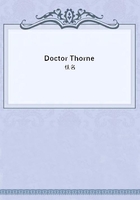
第37章
Whether or not the exact truth was surmised by any, it matters not to say; with absolute exactness, probably not; with great approach to it, probably yes. By one person, at any rate, no guess whatever was made; no thought relative to Dr Thorne's niece ever troubled him; no idea that Mary Scatcherd had left a child in England ever occurred to him; and that person was Roger Scatcherd, Mary's brother.
To one friend, and only one, did the doctor tell the whole truth, and that was to the old squire. 'I have told you,' said the doctor, 'partly that you may know that the child has no right to mix with your children if you think much of such things. Do you, however, see to this. I would rather that no one else should be told.'
No one else had been told; and the squire had 'seen to it,' by accustoming himself to look at Mary Thorne running about the house with his own children as though she were of the same brood. Indeed, the squire had always been fond of Mary, had personally noticed her, and, in the affair of Mam'selle Larron, had declared that he would have her placed at once on the bench of magistrates;--much to the disgust of the Lady Arabella.
And so things had gone on and on, and had not been thought of with much downright thinking; till now, when she was one-and-twenty years of age, his niece came to him, asking as to her position, and inquiring in what rank of life she was to find a husband.
And so the doctor walked, backwards and forwards through the garden, slowly, thinking now with some earnestness what if, after all, he had been wrong about his niece? What if by endeavouring to place her in the position of a lady, he had falsely so placed her, and robbed her of her legitimate position? What if there was no rank of life in which she could now properly attach herself?
And then, how had it answered, that plan of his of keeping her all to himself? He, Dr Thorne, was still a poor man; the gift of saving money had not been his; he had ever a comfortable house for her to live in, and, in spite of Doctors Fillgrave, Century, Rerechild, and others, had made from his profession an income sufficient for their joint wants; but he had not done as others do: he had no three or four thousand pounds in the Three per Cents., on which Mary might live in some comfort when he should die. Late in life he had insured his life for eight hundred pounds; and to that, and that only, had he to trust for Mary's future maintenance. How had it answered, then, this plan of letting her be unknown to, and undreamed of, by, those who were as near to her on her mother's side as he was on the father's? On that side, though there had been utter poverty, there was now absolute wealth.
But when he took her to himself, had he not rescued her from the very depths of the lowest misery: from the degradation of the workhouse; from the scorn of honest-born charity-children; from the lowest of the world's low conditions? Was she not now the apple of his eye, his one great sovereign comfort--his pride, his happiness, his glory? Was he to make her over, to make any portion of her over to others, if, by doing so, she might be able to share the wealth, as well as the coarse manners and uncouth society of her at present unknown connexions? He, who had never worshipped wealth on his own behalf; he, who had scorned the idol of the gold, and had ever been teaching her to scorn it; was he now to show that his philosophy had all been false as soon as the temptation to do so was put in his way?
But yet, what man would marry this bastard child, without a sixpence, and bring not only poverty, but ill blood also on his own children? It might be very well for him, Dr Thorne; for him whose career was made, whose name, at any rate, was his own; for him who had a fixed standing-ground in the world; it might be well for him to indulge in large views of a philosophy antagonistic to the world's practice; but had he a right to do it for his niece? What man would marry a girl so placed? For those among whom she might have legitimately found a level, education had now utterly unfitted her. And then, he well knew that she would never put out her hand in token of love to any one without telling all she knew and all she surmised as to her own birth.
And that question of this evening; had it not been instigated by some appeal on her part? Was there not already within her breast some cause for disquietude which had made her so pertinacious? Why else had she told him then, for the first time, that she did not know where to rank herself? If such an appeal had been made to her, it must have come from young Frank Gresham. What, in such case, would it behove him to do? Should he pack up his all, his lancet-case, pestle and mortar, and seek anew fresh ground in a new world, leaving behind a huge triumph to those learned enemies of his, Fillgrave, Century, and Rerechild? Better that than remain at Greshamsbury at the cost of the child's heart and pride.
And so he walked slowly backwards and forwards through his garden, meditating these things painfully enough.